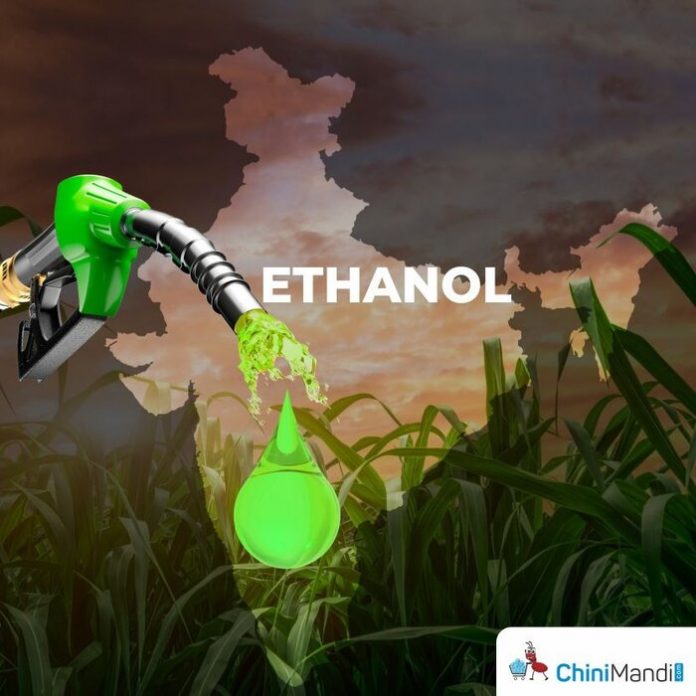Ethanol is evidently being a game-changer for the Indian sugar industry with the aim to enhance India’s energy security. The target of 10% blending under the Ethanol Blending Programme (EBP) has been achieved much ahead of the targeted timelines of November, 2022 by the Public Sector OMCs. This achievement has augmented India’s energy security, translated into a forex impact of over Rs.41,500 crores, reduced GHG emissions of 27 lakh MT and also led to the expeditious payment of over Rs.40,600 crores to farmers. With all the initiatives taken by the Government, the EBP Programme is on track to achieve the target of 20% blending by 2025-26 with the sugar industry spearheading the program.
To increase production of fuel grade ethanol, the Government of India is also encouraging distilleries to produce ethanol from maize & rice available with FCI. The existing installed ethanol distilleries have reached around 700 crore litres and are likely to reach more than 1,200 crore litres for 20 per cent blending by 2025-26.
In conversation with ChiniMandi News, two major ethanol producers from the Indian sugar industry shared their views on how the Ethanol Supply Year 2021-22 has been so far, how their organization is placed for supporting the Ethanol Blending Programme and what are the other steps that the Government should take to formulate a speedier and smoother ethanol blending programme.
Mr. BB Mehta – Whole Time Director & CEO – Dalmia Bharat Sugar and Industries Ltd. shared, “Ethanol blending has really accelerated this Ethanol year and the dispatches have been as per allocations at least in majority of the oil depots. With ethanol tanks coming up at these depots with constant pushing from Department of Food & Public Distribution as well as Ministry of Petroleum and Natural Gas, the dispatches this year so far have been very favourable. Increased blending to 11% has also boosted the demand and has helped ethanol producers to carry lower inventories as well. Going forward, with lower excise on 12% and 15% blended fuel, Govt’s promotion to the National Biofuel Policy gets substantiated. This is going to help the sugar industry manage an equilibrium between the sugar and ethanol production which can directly benefit the financial health of the sector in the medium to long run.
However, two aspects are very important for the Government to look into continuously. Firstly, with fuel price increasing, the negative freight is still a big negative especially for outside states and needs to be relooked at. Second is, with clearly sucrose availability increasing phenomenally in India, more diversion can be promoted through a slightly more attractive price for ethanol from sugarcane juice. Furthermore, an early decision and announcement on 12% blending and next Ethanol Supply Year prices shall help the producers, especially the sugar millers, to plan the production in a much better way.”
“Dalmia Bharat Sugar has been at the forefront in supporting the Biofuel Policy and proudly the second largest suppliers in the country producing Ethanol from Sugarcane Juice/Syrup. Our endeavor is to continue expanding to maximize the ethanol production in existing capacities as well as we are looking forward to our grain distillery to start towards the end of the year.” He added.
Mr. Vijendra Singh – Executive Director & Dy. CEO, Shree Renuka Sugars commented saying, “After the Covid-19 pandemic related recession, the demand for Ethanol has surged. As against the quantity of 440.60 crore litres in this Ethanol Supply Year 2021-22, the industry has already supplied over 246.40 crore litres as on 19th June 2022 which is about 56%. All the leading ethanol producing states have achieved more than 10% ethanol blending now and will continue to supply more ethanol. The second half of the supply year is generally with less supplies being off-crop season, the supply generally tapers during the second half of the supply year. We have already supplied 87% of our contracted quantity which is 14 crore litres this year. Further, we have maintained ample feedstocks to produce ethanol during off-crop period and supply may reduce only marginally during the balance period of the supply year.
Government of India has announced a concession in excise duty for 12%-15% ethanol-blended petrol, and 20% on blending it with diesel. The move has been aimed at bringing down the price of the fuel. In my opinion, as major ethanol producing states have already crossed 10% ethanol blending, it is necessary to emphasize focus for roll out of flex-fuel vehicles at the earliest. The major share of petrol sales is to two wheelers at 59% followed by 36.62% to private cars as per CRISIL’s all India survey on sectoral demand for Petrol & Diesel. Further, petrol sales to the two-wheeler segment is highest in Uttar Pradesh, Maharashtra and Tamil Nadu, accounting to about 33% of the overall sales. Hence, if we can roll out two-wheelers using 100% ethanol then we could immediately achieve very high blending ratios in states like Uttar Pradesh, Karnataka, Maharashtra and their neighbouring states like Goa, Delhi, Tamil Nadu, Haryana etc. To encourage ethanol production from Cane Juice/Syrup there is a need to improve the prices of ethanol from sugarcane juice further to make it more attractive than sugar. This will motivate industry to produce ethanol in states where sugar prices are higher. Also, inter/intra state movement of B Heavy molasses and Syrup should be freely allowed. Also, the cost of transportation of ethanol has increased substantially and hence freight rate should be increased accordingly.
We at Shree Renuka Sugars Ltd. are fully supportive of the Ethanol Blending Program and have been expanding our ethanol production capacities. In the first phase we have increased our production capacity by 26% and in the second phase we are in the process of doubling our ethanol production capacities. With this we shall be able to supply double the present quantity of ethanol when 20% blending is initiated by the Government.”
Speaking to ChiniMandi, Mr. Vijay Nirani, Managing Director – MRN Group shared his views, he said,“Achieving the target of 10% blending under the Ethanol Blending Programme much ahead of the targeted timelines is truly one of the most significant achievements by our Nation. And this has been possible primarily due to the laser sharp vision of our Central Government and the support and dedication of various sugar mills and distilleries. It is indeed proud moment for all of us. With that being said, we are in fact looking forward to a more successful quarter ahead despite this not being the active season for sugarcane crushing, due to a lot of pre-planned and pre implemented arrangements, we are producing ethanol at almost full capacity. This is not at all a challenge or even a concern for us. We are well equipped with ample and even more supply of raw materials that will match our ethanol production targets. We have ensured that molasses is readily available to be processed immediately. We are also purchasing the raw materials from various other sugar mills that is very beneficial for them as well as allows us to ensure that our ethanol production targets are exceeded.”
“Recently the government has announced a concession in excise duty for 12%-15% ethanol-blended petrol and 20% on blending it with diesel. It is my honest opinion that the central government has undertaken these initiatives in a very efficient and wonderful manner. The dedication which they are working towards this is truly commendable. However, I do feel that many state governments can also be more actively involved and supportive in ensuring a smoother and faster Ethanol Blending Programme. For example, states can also launch their own biofuels policy, promoting the industrial community to further grow their ethanol businesses. An aggressive and engaging campaign to make aware to the public about the EBP and the various phenomenally positive effects of ethanol can further enhance public receptiveness and awareness to this magnificent scheme.”
“It’s honestly an exciting time, especially when we are seeing a shift to the era of ethanol. We are certain that these targets will actually be met much before their deadlines. At TruAlt Bioenergy (a subsidiary of MRN Group), while sustainability is at our core, we are also focussed on sustainable development. Our growth strategies have already been chalked out and the execution as well is nearing completion. Our infrastructure has been upgraded, arrangements for raw materials have been made and we are certain that all of us are going to achieve these targets with ease and grow together.” Nirani further added.












